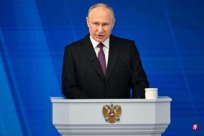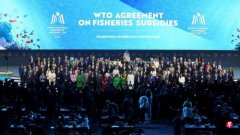
(Abu Dhabi Comprehensive Electric) At the time of deepening global geopolitical and economic division, the World Trade Organization Ministerial Meeting has fallen into a deadlock, extending negotiations and consultations several times, and it has not ended until late on Friday.
The 13th World Trade Organization (WTO) Ministerial Meeting was held at Abu Dhabi, the capital of the United Arab Emirates. The representative from 164 economies was originally scheduled to end the meeting on Thursday (February 29). HoweverResolving the insights on key issues such as food security and fishery subsidies, and negotiations and consultations have extended several extensions.
Europe and India have recently exploded many rounds of farmers demonstrations, and the agricultural agreement has become one of the sensitive issues of the Minister of Minister's Association.India and other member economies require that the permanent rules of managing public food reserves are formulated to replace temporary measures adopted by the WTO.
The draft documents will be advanced in this direction, but some representatives warn that such plans may affect global commodity prices.
The new agreement on fishery subsidies is also deadlocked.Following the agreement to achieve prohibited subsidies from illegal, not declare, and non -controlling fishing activities in 2022, the WTO hopes to reach a second set of solutions, focusing on solving subsidies that lead to excess capacity and excessive fishing.
The new solution provides flexibility and advantages for developing countries, but India and other countries require re -concessions on issues such as differential transition periods.As of the closing meeting, the parties have not reached a consensus on matters such as the transition period and the definition of specific exemptions of small individual fisheries.
The Pacific Island Kingdom complained that during the meeting, most countries ignored them.
India and South Africa oppose extended digital trade tariff suspension
In addition, India and South Africa oppose the suspension of digital trade tariffs on the grounds that the government has suffered huge tariff income loss, and the development of the digital industry is also damaged.The European Union and the United Kingdom have supported extension of the governments and business circles of the United Kingdom, saying that if it is suspended, the loss of domestic GDP (GDP) in many countries will greatly exceed tariff returns.
If the delay is decided that the consensus will not be obtained in the end, cross -border electronic transportation may be levied tariffs in the future.
On the other hand, India and China, the core members of the BRICS Group (BRICS), have differences in important issues such as investment.U.S. trade representative Dai Qi said in an earlier interview that if the negotiations fail in this area, it will not be related to the cracks between the five BRICS countries.
In addition, the parties to the meeting will agree to continue to negotiate this year, hoping to reverse the crisis of the World Trade Organization dispute resolution mechanism.Since the United States prevented the appointment of new judges to the World Trade Organization Appeals, the dispute resolution mechanism has been paralyzed; although Daiqi said that the related negotiations of the issue have made progress, but other representatives are still worried.




